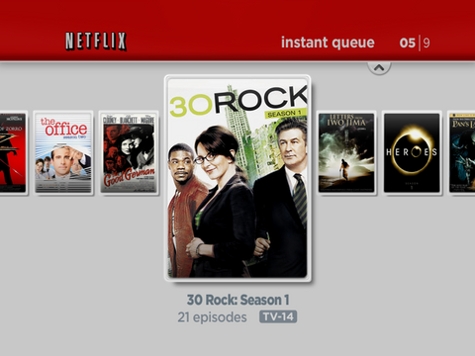At $99, Roku rulez with incredible future potential


Roku is a couch potato's delight, but there's so much unrealized potential.
A couple of weeks ago I inquired with the folks over at Roku about their low-cost, $99, on-demand streaming content player, and asked if they could send me over an evaluation unit.
Man, am I in love with this thing.
Click on the "Read the rest of this entry" link below for more.
The premise is pretty easy to grok -- $99 paperback-sized set-top box, with built-in HDMI output (and legacy outputs for older sets including that old analog set you don't feel like replacing) with integrated ethernet port that connects to your broadband Internet, and is combined with your existing Netflix subscription which can stream a library of 12,000 movies at crystal clear HD-upscaled DVD resolution direct to your TV. All you can eat, unlimited downloads. No extra fees. Totally solid state, low power, no hard disk, nothing to schedule. Just go to the Netflix site on your web browser, add a bunch of movies you want to see in your queue, and watch them instantly on the Roku.
Yes, there are a bunch of limitations. But at $99, and for all-you-can-eat on top of my existing $8.99 Netflix DVD queue for no extra money per month, I'm not going to complain too much. Most of the content on Netflix's instant-view queue is older movies and previous seasons of TV shows, although there is some fairly recent stuff there as well, and more content is being added all the time. There's a ton of great classic movies and TV, and if you have little kids and an old TV in the basement that is otherwise going to get lost in the analog apocalypse in February, there's plenty of content that is child appropriate that you can have complete control over.
Granted, there is also the issue of needing a decent broadband connection and the lag required to queue up enough cached content before it can start playing a movie. On my Cablevision/Optimum Online 20Mbps connection, it takes about 30 seconds before a movie can play, and since the unit has only like a minute or two of cache, it's a little cumbersome to do instant replays as well.
You also can't browse the entire Netflix instant play library and directly add to the queue from the Roku device -- it still requires that you go to your desktop browser to add content to the machine. The interface is extremely limited. I expect, however, with the price of SSD units dropping, and with Fiber-Optic 100Mbps+ connections direct to the home becoming more commonplace over the next few years, and rich embedded OSes like Android maturing these early adopter issues will be less of a problem in the future. Netflix also announced today that Korean consumer electronics manufacturer LG Electronics would be building Roku functionality into the next-generation of their HDTVs, as some of ther DVD player units have now -- I expect other TV and DVD player manufacturers to follow.
The potential for the Roku going forward is practically unlimited, and I think we've barely scratched the surface of what this thing or future devices similar to it could do. I love the idea of a totally solid-state device with no hard disks to crash, with all of the content stored online.
Ideally, I'd love to completely toss my satellite service and my DVRs, and have everything I'd ever want to watch completely on-demand. No more missed recordings, no more tuner scheduling, and no more atmospheric interference resulting in botched digital recording quality or black screens. And nobody would need a stupid Blu-Ray player or a disc library, because apparently Roku is now rolling out a patch which provides true HD content capability to the unit.
But why stop at movies and TV shows? Why not boost the capability of the Roku with something like an OMAP 35xx processor in a BeagleBoard? How about some interactive content, like educational distance learning material, or computer-based training courses? Or all of your iTunes content? Why not throw them on the desktop, with a mouse and a keyboard, and remotely host your entire home computing environment?
Do you love your Roku? Talk Back and Let Me Know.